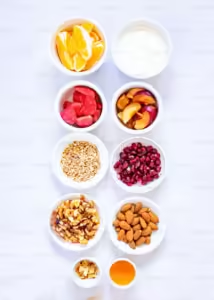10 Essential Nutrients for Teenagers
- Dr Maryum Sohail
- September 28, 2023
- 8:51 pm

During adolescence, teenagers experience rapid growth and development, making it crucial to ensure they receive adequate nutrition. Here are some essential nutrients that play a vital role in teenagers’ growth and development:

What are the Essential Nutrients for Teens?
1. Protein
Protein is essential for building and repairing tissues, supporting muscle growth, and maintaining a strong immune system. Good sources of protein include lean meats, poultry, fish, eggs, dairy products, legumes, nuts, and seeds.
2. Calcium
Calcium is critical for the development of strong bones and teeth. It also plays a role in muscle function, nerve transmission, and blood clotting. Dairy products, fortified plant-based milk alternatives, leafy green vegetables, tofu, and calcium-fortified foods are excellent sources of calcium.
3. Iron
Iron is necessary for the production of red blood cells, which carry oxygen throughout the body. Teenagers, especially girls, are at a higher risk of iron deficiency due to rapid growth and menstrual blood loss. Iron-rich foods include lean meats, poultry, fish, legumes, fortified cereals, and leafy green vegetables. Consuming vitamin C-rich foods (such as citrus fruits) alongside iron-rich foods enhances iron absorption.
4. Vitamin D
Vitamin D is crucial for calcium absorption and bone health. It can be obtained through sunlight exposure and dietary sources such as fatty fish (salmon, mackerel), fortified dairy products, and fortified plant-based milk alternatives. If sunlight exposure is limited, a vitamin D supplement may be recommended.
5. B vitamins
B vitamins, including thiamine, riboflavin, niacin, vitamin B6, and vitamin B12, are involved in energy production, brain function, and red blood cell production. Whole grains, lean meats, fish, poultry, eggs, dairy products, legumes, and leafy green vegetables are good sources of B vitamins.
6. Omega-3 fatty acids
Omega-3 fatty acids, particularly EPA and DHA, are essential for brain development and function. Fatty fish (such as salmon, mackerel, and sardines), flaxseeds, chia seeds, walnuts, and fortified foods are rich sources of omega-3 fatty acids.
Also read, Healthy Eating Habits: 10 Tips For Adults
7. Fiber
Adequate fiber intake promotes digestive health and helps maintain a healthy weight. Whole grains, fruits, vegetables, legumes, nuts, and seeds are excellent sources of fiber.
8. Vitamin A
Vitamin A is crucial for vision, immune function, and cell growth. Good sources include carrots, sweet potatoes, spinach, kale, eggs, and liver.
9. Zinc
Zinc is important for growth, immune function, and wound healing. Seafood, lean meats, poultry, legumes, nuts, seeds, and whole grains are good sources of zinc.
10. Water
Staying hydrated is essential for overall health and supports proper digestion, circulation, and temperature regulation. Encourage teenagers to drink water throughout the day and limit sugary beverages.
It’s important for teenagers to consume a balanced diet that includes a variety of nutrient-dense foods to meet their essential nutrients needs. Encouraging healthy eating habits and providing a supportive environment for nutritious meals can contribute to their optimal growth and development.
Dr Maryum Sohail
Subscribe to Dr Owais YouTube channel
For parenting advice, child health, symptoms, causes and treatment of illness in children.






